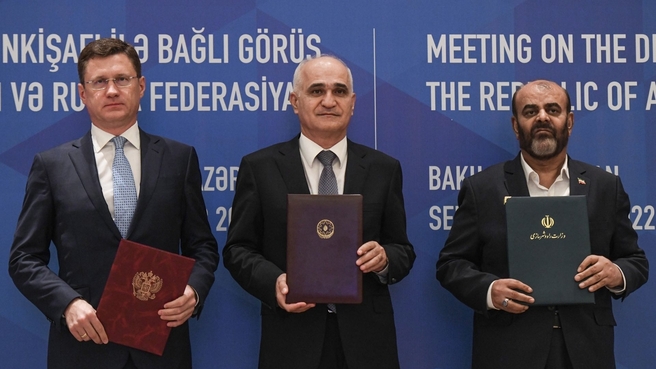The Russian Federation, the Republic of Azerbaijan and the Islamic Republic of Iran will jointly develop the North–South international transport corridor project. The relevant development declaration was signed by Deputy Prime Minister of Russia Alexander Novak, Deputy Prime Minister of the Republic of Azerbaijan Shahin Mustafayev and Minister of Roads and Urban Development of the Islamic Republic of Iran Rustam Ghasemi.

МТК “Север – Юг”
According to the declaration, the parties expressed their readiness to cooperate in the field of assessment and analysis of infrastructure and opportunities for the use of the North–South transport corridor. In addition, the countries emphasize the importance of creating a joint Russia–Azerbaijan–Iran working group and intend to hold the first meeting within a month. As Alexander Novak noted, the trilateral working group on the implementation of the project was established in accordance with the agreements of the presidents of the three countries.
“Russia is ready for fruitful cooperation in a trilateral format on the implementation of the project. This will ensure seamless transportation of goods from the Russian Federation to Iranian ports in the Persian Gulf. The route with a length of more than 4 thousand km should connect the ports of the Baltic with the ports of the Persian Gulf and provide an opportunity to increase cargo traffic both in one direction and in the other. Thus, the North–South project will almost halve the delivery time of goods from the Asia-Pacific region to Europe and vice versa,” the Deputy Prime Minister said.
According to Alexander Novak, the Russian side considers it important to resolve operational issues on the project within the framework of the working group. One of them is to develop a list of specific measures over the next few months to eliminate bottlenecks, calculate the investments needed to attract, and also prepare proposals for managing funding sources.
“It is necessary to form a full–format intergovernmental trilateral agreement on the implementation of the project, which will significantly expand transport links for many years,” he stressed.
The Deputy Prime Minister also noted that the new route will not be able to increase capacity without the introduction of additional railway infrastructure, in particular the Iranian Rasht-Astara highway with a length of 164 km to create a unified railway network of the western route. According to him, the construction of the railway line will take several years. “This site will be completed as part of our joint work. We have agreed that this will be the main route of railway communication,” he said.
At the same time, first of all, according to the Deputy Prime Minister, it is necessary to settle issues with property rights to land and land use, as well as to ensure the protection of investments of the parties. In addition, the Deputy Prime Minister noted, the future railway route should include logistics centers and services for transshipment of Russian goods in the ports of Enzeli, Bandar Abbas, a terminal in the port of Bandar Abbas for transshipment of goods going to and from the countries of the Persian Gulf and South Asia, as well as provide for the creation of a transport and logistics hub in the port area of Bandar Abbas.
To ensure the seamless and efficient operation of the North–South corridor, the Russian side has now developed a list of measures to create the necessary infrastructure, the Deputy Prime Minister added. “Today, within the framework of trilateral consultations, we agreed that within two months a list of projects will be worked out that require expanding bottlenecks, increasing capacity,” Alexander Novak said.
Another equally important component of the success of the project will be the simplification and removal of administrative barriers for cargo senders, Alexander Novak continued. “We will create a system of management and administration, registration of customs checkpoints, logistics centers that are necessary for this project at transshipment points and directly at ports,” the Deputy Prime Minister added.
The implementation of the project will have a cumulative effect on the economies of the three countries, entrepreneurship, increase trade turnover, supplies and transit of goods, Alexander Novak noted.
Following the signing, Alexander Novak also held a bilateral meeting with the Minister of Roads and Urban Development of Iran, Rustam Ghasemi, at which the parties discussed topical issues of cooperation between Russia and Iran in the economic sphere, as well as the development of logistics projects.
Source: Russian Government





